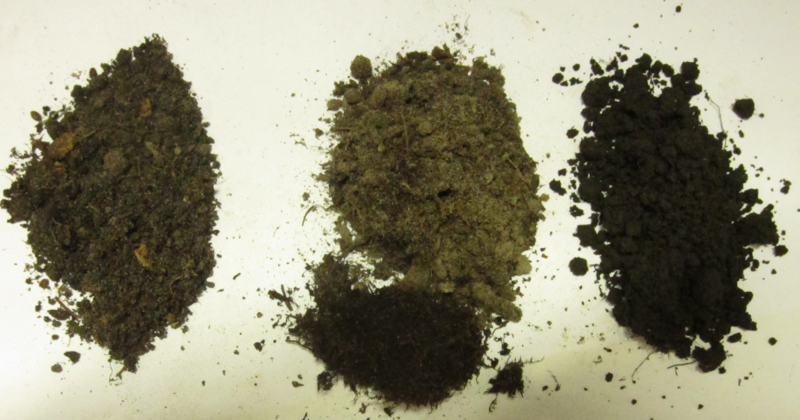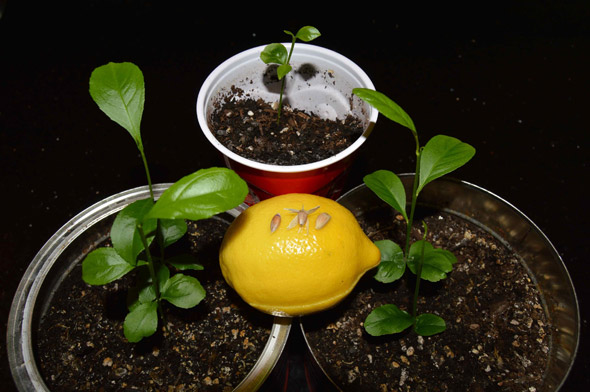Land for lemon growing at home
Plant lovers plant lemon trees not in the garden, but at home - in a pot. Such conditions are more suitable than others for a capricious exotic tree, because it is easier to provide it with proper care at home. One of the conditions for the beauty and health of a plant is a balanced and nutritious soil. What should be the soil for lemon at home and how to prepare it, we will consider in the article.
The content of the article
What soil is needed for indoor lemon
For growing indoor lemon, choose a breathable and light soil. The optimum acidity level is 5.5-7 pH, too acidic soil leads to diseases and plant death.
There should be no large clods of earth in the soil. This prevents the root system from absorbing nutrients, which leads to micronutrient deficiencies. Also, there should be no leaves, branches and other foreign bodies in the soil.
A soil mixture is prepared from several components. A suitable option is the composition of garden and leafy soil. It is lightweight and nutritious, breathable and moisture-permeable.
It is recommended to take crumbly garden soil, disinfect it before use to get rid of bacteria and insects. Garden land is harvested in the summer, cutting off the layer and sifting it through a fine sieve.
Leafy ground is a humus of fallen leaves. To prepare such a soil for lemon, summer residents rake all the fallen leaves into a heap, which is watered with warm water and slurry. To reduce acidity, add 500 g of lime. The soil is loose, light and nutritious.
Attention! To increase the air permeability of the earth, refined river sand is added. It interferes with the proliferation of fungi and bacteria that lead to root rot in indoor lemon. In addition, the sand retains heat and moisture.
Making lemon earth at home
It is better to plant lemon in prepared soil. For this, summer residents acquire the necessary ingredients and equipment, study the technology of soil preparation.
Let us study further what kind of land is needed for a lemon.
Required ingredients
There are many options for making soil for indoor lemon. One of the most common is a mixture of garden, turf, leafy soil with the addition of charcoal and manure. Also, nutrient soil is obtained from a mixture of sod and leafy soil with the addition of peat.
That is, almost all technologies contain the following ingredients:
- garden land;
- sheet;
- sod;
- peat;
- humus;
- river sand;
- charcoal.
To prepare earth for indoor lemon, artificial components are also used:
- Vermiculite. Outwardly similar to wood chips, environmentally friendly and safe. It absorbs excess water and can replace river sand. Contains magnesium, calcium, iron and silicon.
- Dolomite. It is useful not only for lemon, but also for all citrus fruits. Contains calcium and manganese, maintains an optimal level of soil acidity and prevents root rot.
Fundamental rules
When using garden soil, check that there are no roots, insects, grass in it. If they are, the soil is pre-cleaned and must be sieved through a sieve.
If leafy soil is used, it is preferable to take it from under the lindens. To do this, remove a layer of 5 cm and sift to get rid of large particles. Experts do not recommend using land from under coniferous trees.It has a high level of acidity and contains substances harmful to indoor lemon.
If the recipe contains charcoal, birch is used. It is crushed into powder, in this form it is absorbed faster. When cooking, make sure that all the ingredients are well mixed with each other and do not contain foreign inclusions.
It is interesting:
Why home-grown lemon doesn't bloom and what to do to fix it
Step-by-step instruction
Homemade indoor lemon soil is better than store-bought one.
Nutrient substrate preparation technology:
- Mix in equal parts sod, leaf, peat soil.
- Add well-washed river sand in the amount of 10% of the total mass.
- Mix everything thoroughly.
- Add 40 g of granulated superphosphate to 1 liter of the finished mixture.
- Steam the mixture in the oven for 2 hours at a temperature of + 90 ° C, cool.
Steaming destroys insect larvae and pathogens diseases... However, along with them, some of the useful substances disappear, the microflora of the substrate deteriorates. To avoid this, only the earth (leaf, garden, turf) is steamed, and the remaining parts (peat, sand) are added at the end.

Fertilizing and soil care for homemade lemon
Indoor lemon should not be overdried, otherwise the plant will shed its leaves and die. For irrigation, thawed river or rainwater is used. In an extreme case, a tap, warmed up to room temperature, is suitable.
Watering lemon over the entire layer of the earth, evenly distributing moisture. In summer, lemon is moistened 3 times a week, in winter - 1 time. Also, the amount of watering depends on where the plant is. For example, if you have a battery, moisten the soil more often.
Lemon reacts well to mineral liquid feed. They are brought in 3 years after landing, use superphosphate or ammonium nitrate. Also, the plant loves complex fertilizers, for example, "Kemiru" or a citrus mixture. They are distinguished by a balanced composition. Fertilizers are applied once every 1.5 months.
Attention! To protect the lemon from diseases and insect pests, the soil is watered with soapy water. 100 g of grated soap is poured into 1 liter of water and brought under the bush.

Conclusion
Before planting a lemon at home, it is recommended to study what kind of land it loves. As a rule, it is a mixture of garden, leaf and turf soil with the addition of sand, charcoal and vermiculite.
The soil mixture should be nutritious and light, without large clods of earth, grass, roots. The ingredients are mixed and steamed in the oven to kill dangerous germs and larvae. During cultivation, lemon is regularly watered and fed with mineral liquid fertilizers.